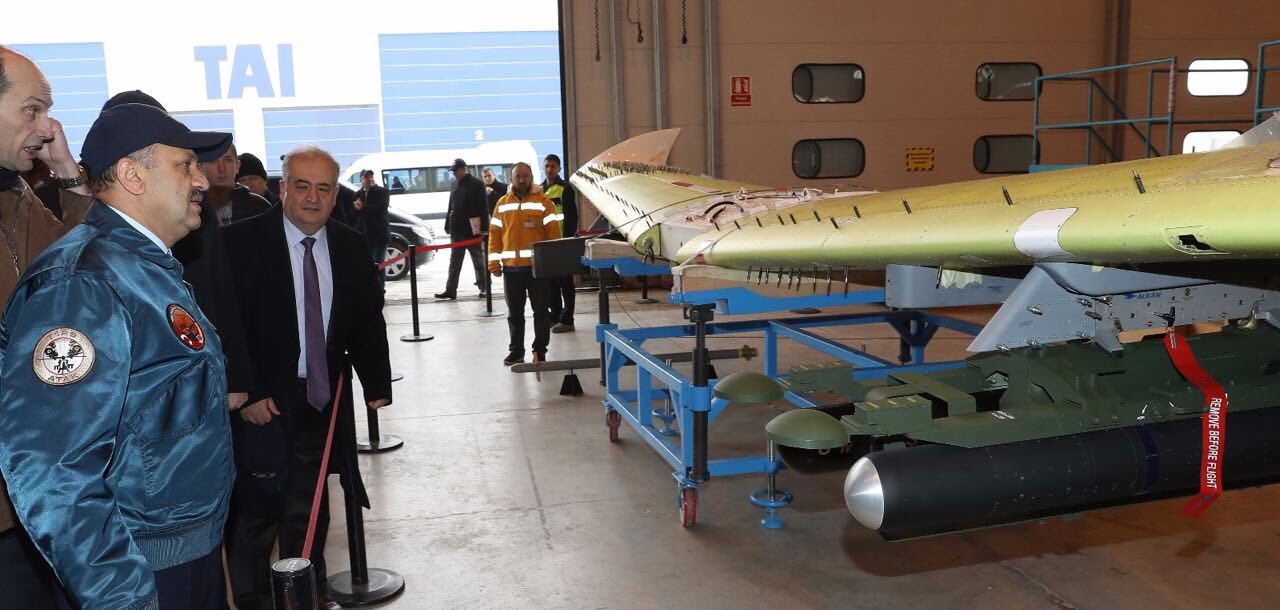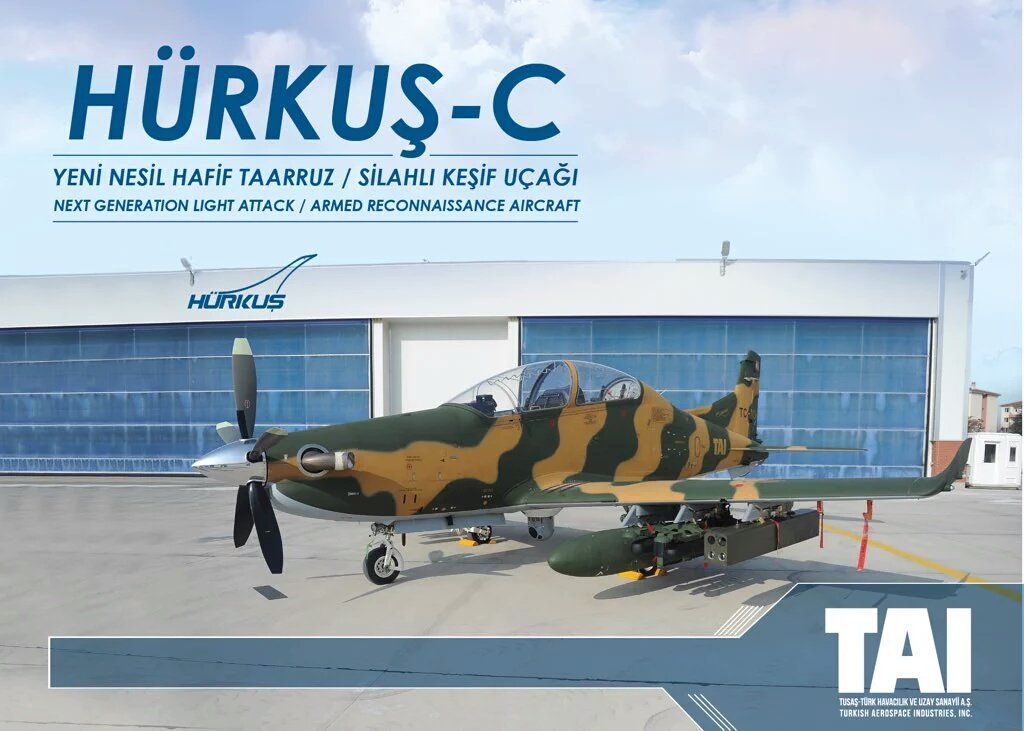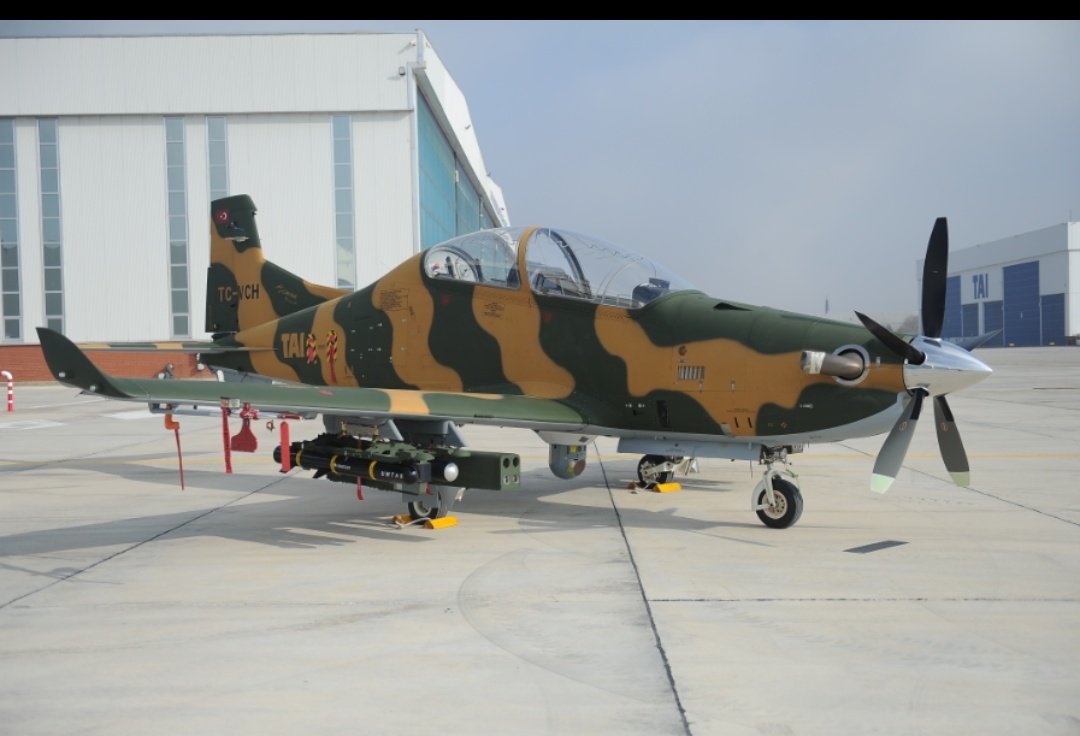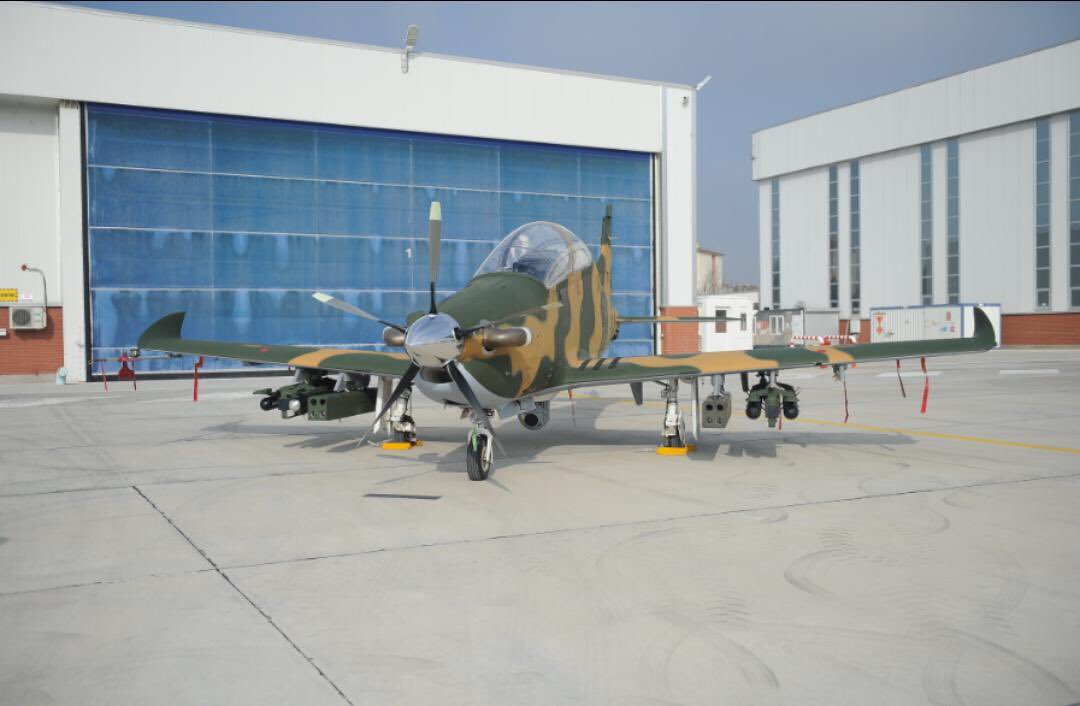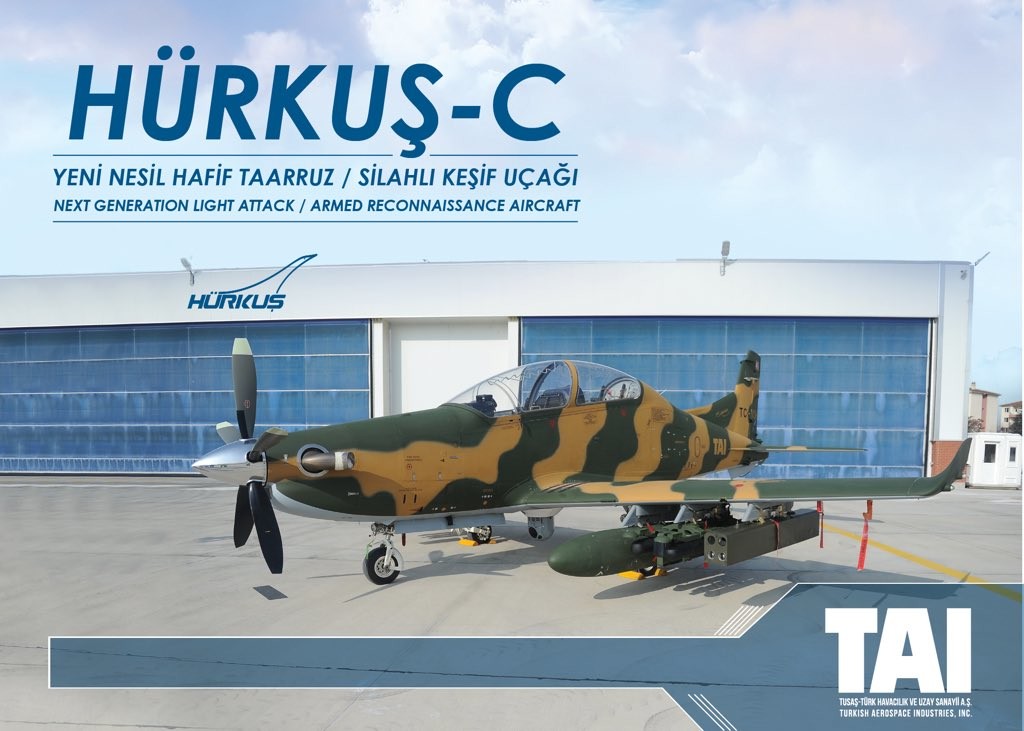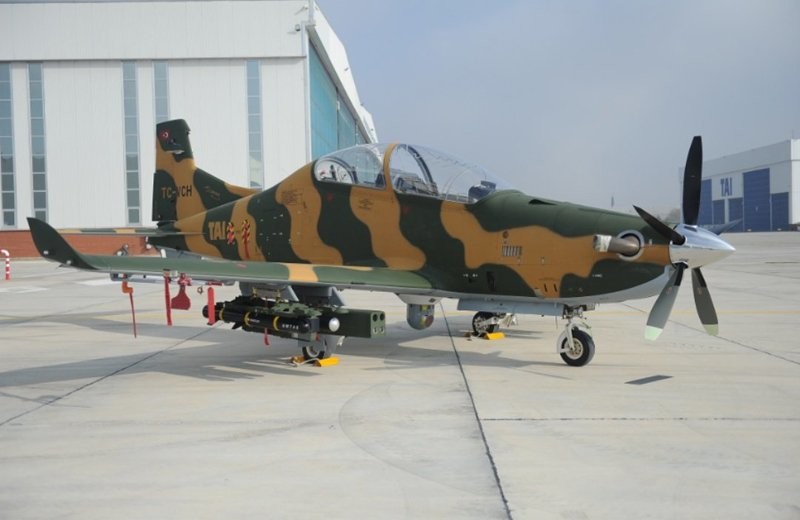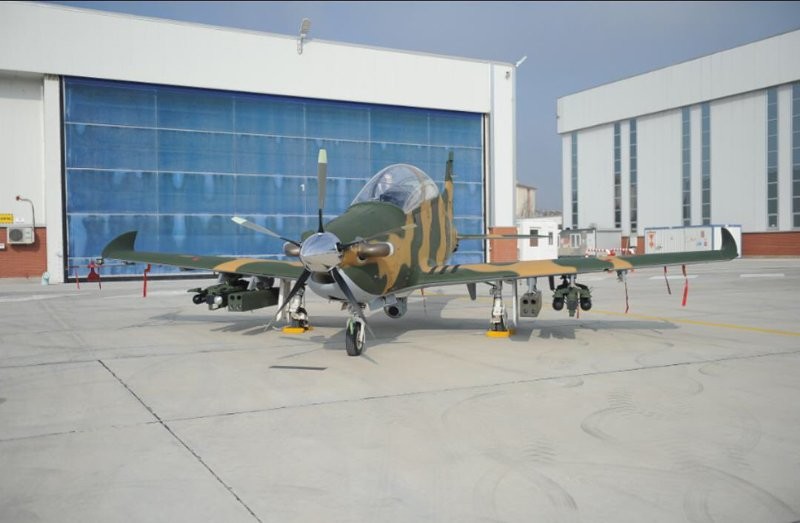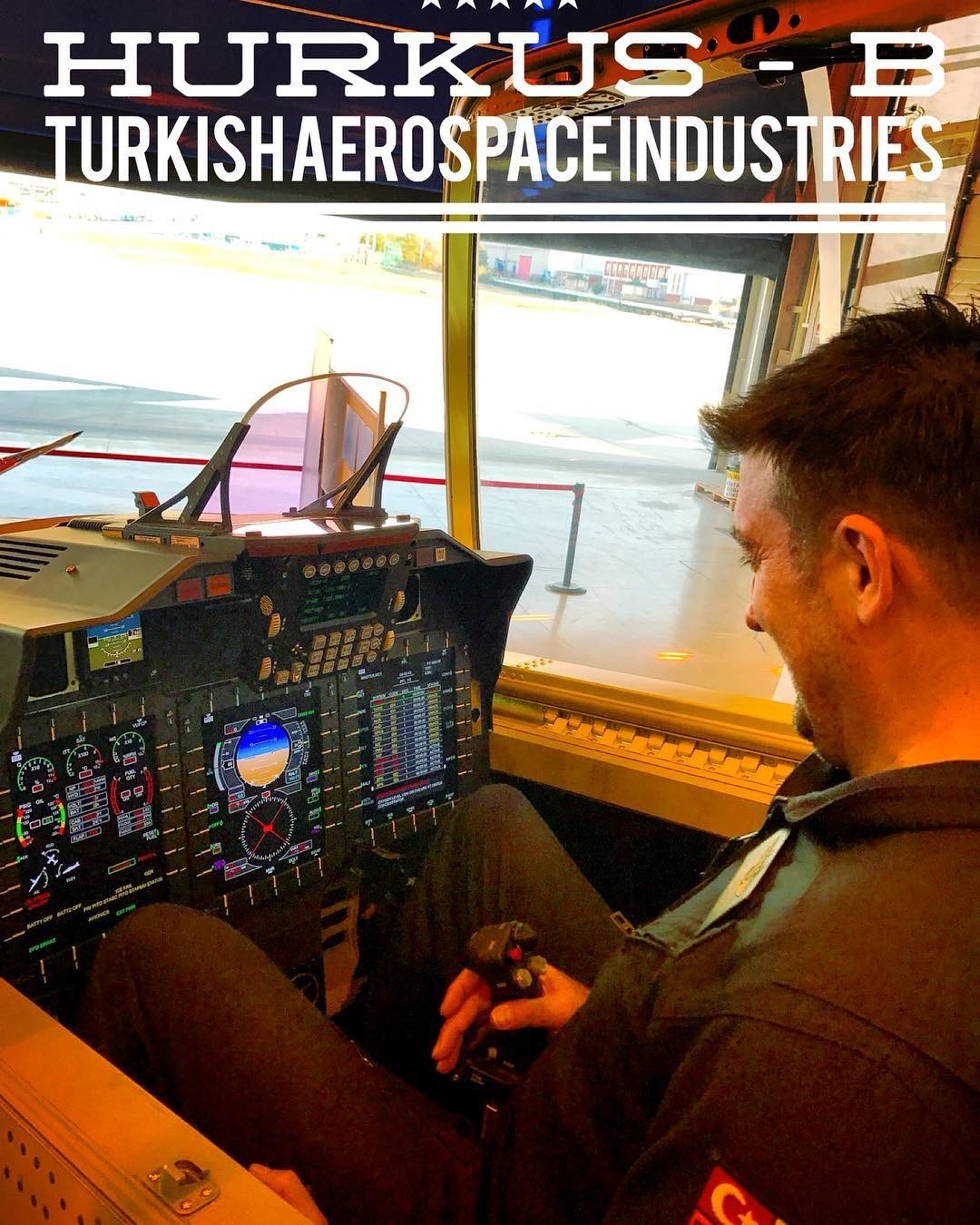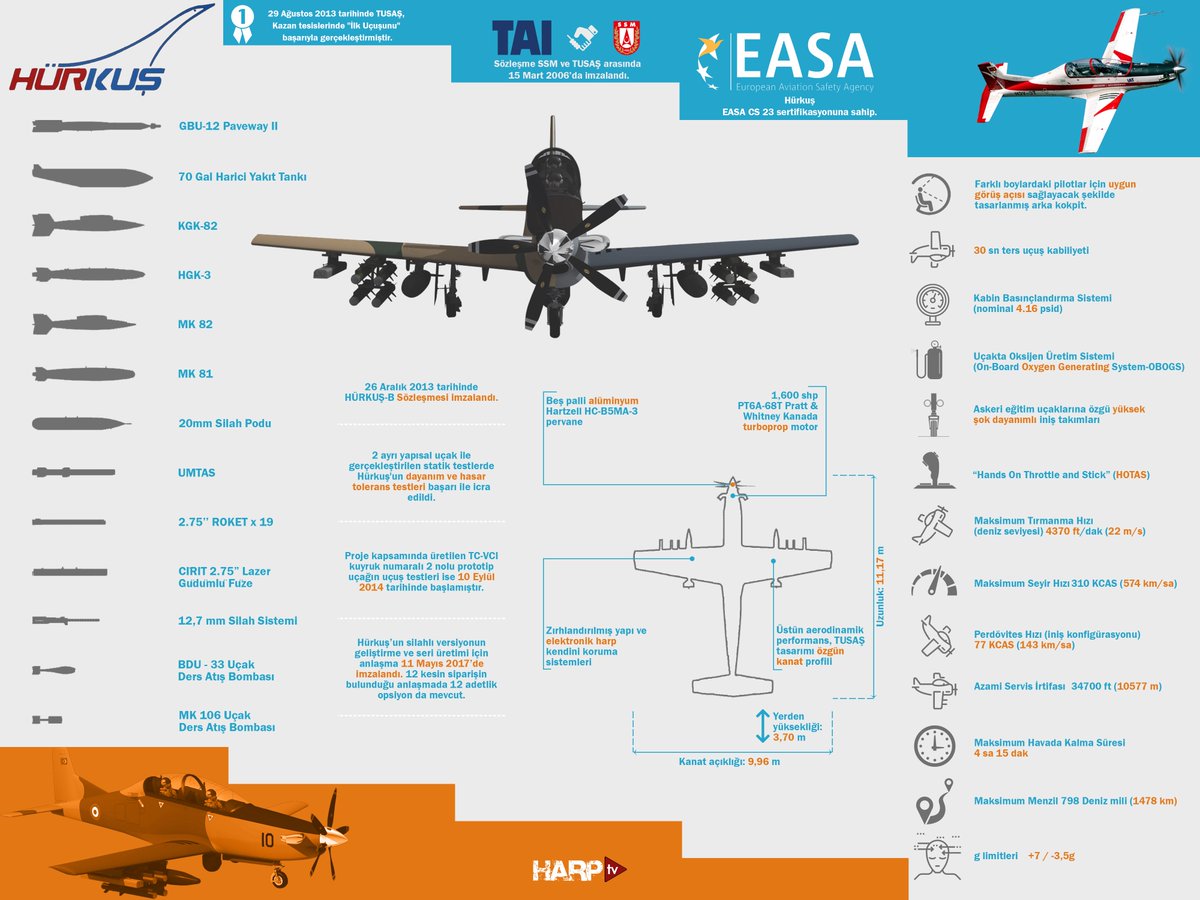تثبيت التطبيق
How to install the app on iOS
Follow along with the video below to see how to install our site as a web app on your home screen.
ملاحظة: This feature may not be available in some browsers.
أنت تستخدم أحد المتصفحات القديمة. قد لا يتم عرض هذا الموقع أو المواقع الأخرى بشكل صحيح.
يجب عليك ترقية متصفحك أو استخدام أحد المتصفحات البديلة.
يجب عليك ترقية متصفحك أو استخدام أحد المتصفحات البديلة.
طائرة Hürkus التركية.. إلى خطوط الأنتاج
- بادئ الموضوع هيرون
- تاريخ البدء
نسخة طائرة التدريب هوركش غير المسلحة
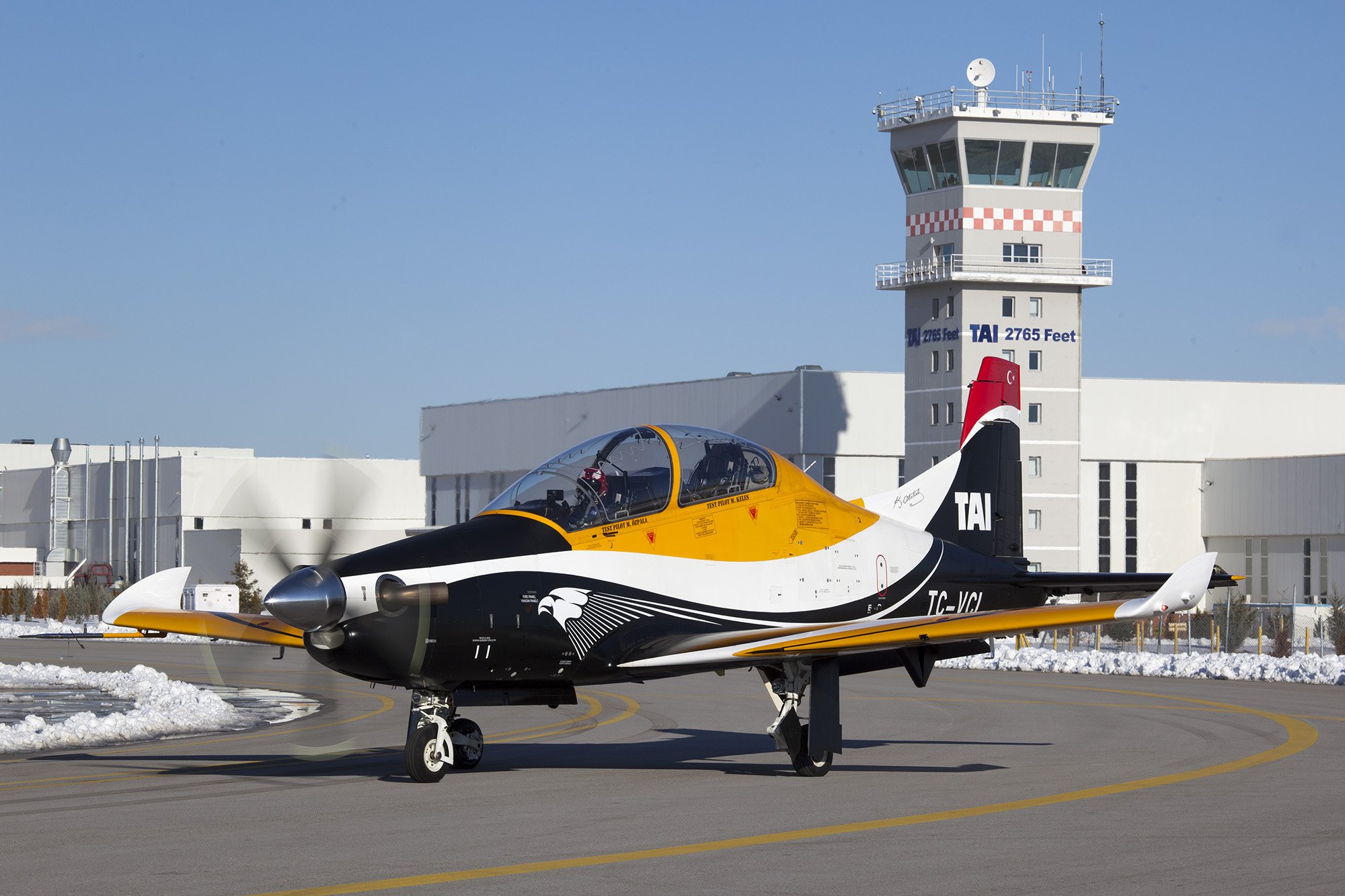

تمويه الطائرة مقزز اشبه بالسحلية أما الصورة التي قبلها فاجمل بكثير .
السلام عليكم
اخواني الاعزاء
شكرا لما تقدموه لنا من معلومات ثمينة و ما تقومون به من رفع للروح المعنوية المحبطة
ولكن دعوني استسمحكم و اسأل عن المحرك
هل هو تركي ؟ ( يارب يكون تركي )
ولو مش تركي ناويين يحطوا فيها محرك تركي ام لا ؟
شاكر لكم اخواني الاعزاء
اخواني الاعزاء
شكرا لما تقدموه لنا من معلومات ثمينة و ما تقومون به من رفع للروح المعنوية المحبطة
ولكن دعوني استسمحكم و اسأل عن المحرك
هل هو تركي ؟ ( يارب يكون تركي )
ولو مش تركي ناويين يحطوا فيها محرك تركي ام لا ؟
شاكر لكم اخواني الاعزاء
أضحك كما تريد ياعزيزي
الطائرة لتدريب الطيارين ولم يعلن الاتراك عن رغبتهم في تسويقها لمكافحه التمرد كما تزعم بل هي طائرة تدريب بالدرجة الأولى ولا رابط يجمعها مع محاوله تسويقك أن الطيران المسير أخذ مكانها فتدريب الطيار لايكون على طائرة مسيره بل طائرة مأهوله
طائرة تصنف مع
Korean KT-1
Brazil Tucano
Switzerland Pilatus
T-6A Texan II
وقدراتها للتدريب بالسلاح والدعم القريب واعدة جداُ وكما قلت لك الخبرات الناتجه عنها ستكون كنز أهم من مبيعات .
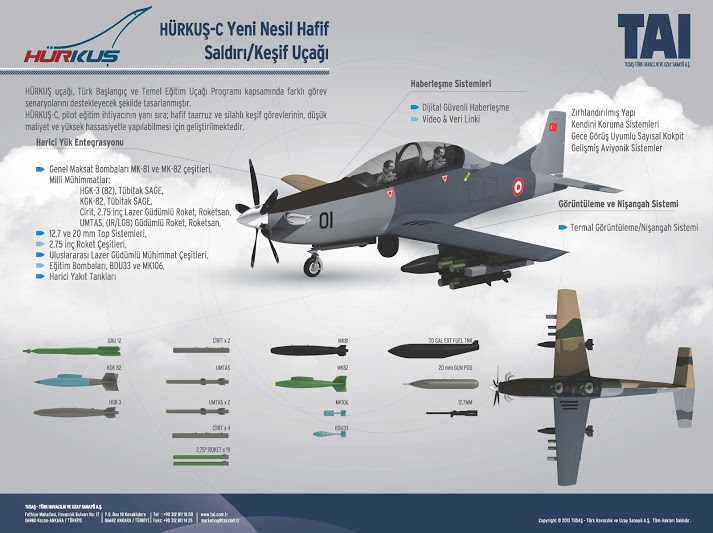
نصيحه اخيره شخصنه الأمور والتهكم بضاعه جربها الكثير واليوم يجنون خيبتها وأما وصفك لي بأخ الترك فنعم الأخوان أحفاد الفاتحين ولي شرف هذة الأخوة .
بما ان كلام استاذ مودي خطأ بالكامل كما احس من كلامك وبصراحة اؤيد الاتراك في نقطة وهي انها تحمل اكثر من ماتحملة الطائرة بدون طيار
لماذا تتعمد الدول شراء مثلا شراء السايدوندر والامرام موجود
انتم مرة مع الاتراك ومرة ضد الاتراك وهكذا كما تفهم وافهم لن يرتقي المنتدي ابدا
لان هذا شغل اطفال
امواااااااه ياهيرون لا تزعل مني
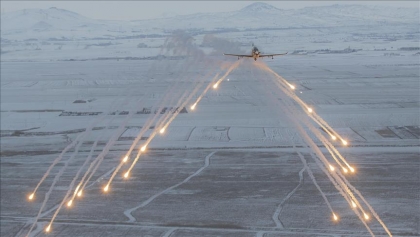
مقاتلة "الطائر الحر" التركية تتجاوز اختبار الحماية الذاتية
ترك برسنجحت النسخة المسلحة من طائرة "حُر قوش" (الطائر الحر) التركية محلية الصنع، في اجتياز اختبار لخاصية الحماية الذاتية.
وحلقت المقاتلة، السبت، في أجواء منطقة "قهرمان قزان" بالعاصمة أنقرة، في إطار الاختبار واجتازته بنجاح، لتتقدم خطوة أخرى نحو الجاهزية الكاملة.
وفي تغريدة عبر تويتر، قال رئيس الصناعات الدفاعية التركية إسماعيل دمير، إن "الطائر الحر" تمضي قدما نحو الانضمام إلى مهام الدعم الجوي قريبا، فضلا عن كونها طائرة تدريب.
وتعمل شركة الصناعات الجوية والفضائية التركية على تطوير الطائرة، بهدف تلبية احتياجات التدريب لدى القوات الجوية، والدعم الجوي القريب في مناطق العمليات لقيادتي القوات البرية والدرك.
كما أجرت المقاتلة أول اختبار لإطلاق النار بصواريخ "لومتاس"، التي تنتجها شركة "روكيتسان" المحلية، في ولاية قونية وسط البلاد.
وتواصل هذه النسخة حاليا اختبارات إطلاق صواريخ وذخائر مختلفة، لتكتسب خصائص جديدة.
ومن المقرر أن تكون المقاتلة بوزن 5 أطنان تقريبا، وقادرة على نقل حمولة بوزن 1.5 طن، مع إمكانية تنفيذ المهام ليلا ونهارا عبر تقنية الأشعة تحت الحمراء.
وتتيح الطائرة التدرّب على الملاحة والطيران الآلي لتنافس قريناتها في العالم
https://www.turkpress.co/node/56284
Armed Hurkus-C successfully completes flight and firing trials
Lale Sariibrahimoglu, Ankara - Jane's Defence Weekly
03 January 2019
Follow
https://twitter.com/JanesIntel
RSS
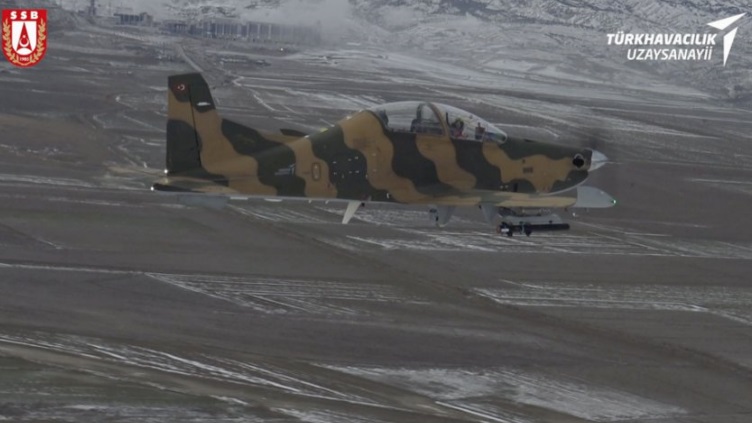
An example of Turkey’s locally developed Hurkus-C basic trainer/light attack aircraft, carrying weaponry and defensive systems to facilitate close air support missions, has successfully completed flight and firing trials. Source: TAI
An example of Turkey's locally developed Hurkus-C basic trainer/light attack aircraft with electronic warfare systems installed has successfully completed flight and firing trials, Turkish Aerospace Industries (TAI) announced on Twitter on 29 December.
This was the first flight of the Hurkus-C carrying weaponry and defensive systems to facilitate close air support missions, Ismail Demir, head of the Presidency of the Turkish Defence Industries (SSB), said in an interview with CNN Türk on 29 December.
In 2017 the type conducted its first firing test with a local Roketsan-made Lumtas laser-guided long-range air-to-surface anti-tank missile. The Hurkus-C, which features five hardpoints and has a 1,500 kg payload capacity, can also deliver other locally developed munitions, including Cirit laser-guided 70 mm rockets and freefall bombs fitted with Teber INS/GPS-aided laser guidance kits. Additionally, it can be armed with general-purpose bombs as well as 12.7 mm and 20 mm gun systems, according to the SSB.
Under a Turkish military request the Hurkus-C will also be able in future to carry heavier munitions, according to Demir. Twelve Hurkus-Cs, with a follow-on option for 12 more, are currently planned for production.
"The objective of our Hurkus-C aircraft, equipped with an armoured structure, self-protection systems, night-vision-compatible digital/glass cockpit and advanced avionics systems, is to undertake light attack and armed reconnaissance missions as well as carrying out pilot training requirements at a low cost and with high precision," said an SSB release posted on its website. "Our aircraft will also have digital secure communications, image and data connections and a thermal imaging/sighting system."
Video and data can be relayed from a Hurkus-C to a ground station in real time, according to TAI.
The Hurkus-C is currently powered by a 1,600hp Pratt & Whitney engine, although Turkey's Tusas Engine Industries (TEI) is developing an indigenous replacement powerplant.
أعلنت شركة صناعة الطيران التركية (TAI) على موقع تويتر يوم 29 ديسمبر من الأمثلة على طائرات Hurkus-C الأساسية المدربة / الهجومية في تركيا والتي تم تطويرها محليًا مع تركيب أنظمة الحرب الإلكترونية.
كانت هذه أول رحلة لطائرة Hurkus-C تحمل أسلحة وأنظمة دفاعية لتسهيل مهام الدعم الجوي القريبة ، حسبما قال إسماعيل ديمير ، رئيس رئاسة صناعات الدفاع التركية (SSB) ، في مقابلة مع محطة CNN Türk في 29 ديسمبر.
في عام 2017 ، أجرى النوع أول اختبار إطلاق له بصاروخ Loktas محلي الصنع من نوع روكتسان طويل المدى موجه بالليزر. يمكن أن يوفر Hurkus-C ، الذي يتميز بخمس نقاط صلبة ولديه حمولة تصل إلى 1500 كجم ، ذخائر أخرى مطورة محليًا ، بما في ذلك صواريخ Cirit الموجهة بأشعة الليزر التي يبلغ قطرها 70 مم وقنابل السقوط الحر المزودة بمجموعات توجيه الليزر التي تستخدم تقنية Teber INS / GPS. بالإضافة إلى ذلك ، يمكن أن تكون مسلحة بقنابل للأغراض العامة بالإضافة إلى أنظمة مدفع 12.7 مم و 20 مم ، طبقًا لـ SSB.
بناءً على طلب عسكري تركي ، ستتمكن Hurkus-C أيضًا في المستقبل من حمل ذخيرة أثقل ، وفقًا لما قاله ديمير. من المخطط حاليًا إنتاج اثني عشر Hurkus-Cs ، مع خيار متابعة لـ 12 آخرين.
"الهدف من طائراتنا Hurkus-C ، المجهزة بهيكل مدرع ، وأنظمة الحماية الذاتية ، قمرة القيادة الرقمية / الزجاجية المتوافقة مع الرؤية الليلية وأنظمة إلكترونيات الطيران المتقدمة ، هو القيام بمهام الهجوم الخفيف والاستطلاع المسلح بالإضافة إلى تنفيذ الطيار "متطلبات التدريب بتكلفة منخفضة وبدقة عالية" ، وقال بيان نشر SSB على موقعها على الانترنت. "ستحتوي طائراتنا أيضًا على اتصالات رقمية آمنة وصورة وبيانات وبيانات ونظام تصوير / رؤية حراري."
يمكن نقل الفيديو والبيانات من محطة Hurkus-C إلى محطة أرضية في الوقت الفعلي ، وفقًا لـ TAI.
يتم تشغيل محرك Hurkus-C حاليًا بواسطة محرك Pratt & Whitney سعة 1600 حصان ، على الرغم من أن شركة Tusas Engine Industries (TEI) التركية تعمل على تطوير محرك بديل محلي.
Lale Sariibrahimoglu, Ankara - Jane's Defence Weekly
03 January 2019
Follow
https://twitter.com/JanesIntel
RSS

An example of Turkey’s locally developed Hurkus-C basic trainer/light attack aircraft, carrying weaponry and defensive systems to facilitate close air support missions, has successfully completed flight and firing trials. Source: TAI
An example of Turkey's locally developed Hurkus-C basic trainer/light attack aircraft with electronic warfare systems installed has successfully completed flight and firing trials, Turkish Aerospace Industries (TAI) announced on Twitter on 29 December.
This was the first flight of the Hurkus-C carrying weaponry and defensive systems to facilitate close air support missions, Ismail Demir, head of the Presidency of the Turkish Defence Industries (SSB), said in an interview with CNN Türk on 29 December.
In 2017 the type conducted its first firing test with a local Roketsan-made Lumtas laser-guided long-range air-to-surface anti-tank missile. The Hurkus-C, which features five hardpoints and has a 1,500 kg payload capacity, can also deliver other locally developed munitions, including Cirit laser-guided 70 mm rockets and freefall bombs fitted with Teber INS/GPS-aided laser guidance kits. Additionally, it can be armed with general-purpose bombs as well as 12.7 mm and 20 mm gun systems, according to the SSB.
Under a Turkish military request the Hurkus-C will also be able in future to carry heavier munitions, according to Demir. Twelve Hurkus-Cs, with a follow-on option for 12 more, are currently planned for production.
"The objective of our Hurkus-C aircraft, equipped with an armoured structure, self-protection systems, night-vision-compatible digital/glass cockpit and advanced avionics systems, is to undertake light attack and armed reconnaissance missions as well as carrying out pilot training requirements at a low cost and with high precision," said an SSB release posted on its website. "Our aircraft will also have digital secure communications, image and data connections and a thermal imaging/sighting system."
Video and data can be relayed from a Hurkus-C to a ground station in real time, according to TAI.
The Hurkus-C is currently powered by a 1,600hp Pratt & Whitney engine, although Turkey's Tusas Engine Industries (TEI) is developing an indigenous replacement powerplant.
أعلنت شركة صناعة الطيران التركية (TAI) على موقع تويتر يوم 29 ديسمبر من الأمثلة على طائرات Hurkus-C الأساسية المدربة / الهجومية في تركيا والتي تم تطويرها محليًا مع تركيب أنظمة الحرب الإلكترونية.
كانت هذه أول رحلة لطائرة Hurkus-C تحمل أسلحة وأنظمة دفاعية لتسهيل مهام الدعم الجوي القريبة ، حسبما قال إسماعيل ديمير ، رئيس رئاسة صناعات الدفاع التركية (SSB) ، في مقابلة مع محطة CNN Türk في 29 ديسمبر.
في عام 2017 ، أجرى النوع أول اختبار إطلاق له بصاروخ Loktas محلي الصنع من نوع روكتسان طويل المدى موجه بالليزر. يمكن أن يوفر Hurkus-C ، الذي يتميز بخمس نقاط صلبة ولديه حمولة تصل إلى 1500 كجم ، ذخائر أخرى مطورة محليًا ، بما في ذلك صواريخ Cirit الموجهة بأشعة الليزر التي يبلغ قطرها 70 مم وقنابل السقوط الحر المزودة بمجموعات توجيه الليزر التي تستخدم تقنية Teber INS / GPS. بالإضافة إلى ذلك ، يمكن أن تكون مسلحة بقنابل للأغراض العامة بالإضافة إلى أنظمة مدفع 12.7 مم و 20 مم ، طبقًا لـ SSB.
بناءً على طلب عسكري تركي ، ستتمكن Hurkus-C أيضًا في المستقبل من حمل ذخيرة أثقل ، وفقًا لما قاله ديمير. من المخطط حاليًا إنتاج اثني عشر Hurkus-Cs ، مع خيار متابعة لـ 12 آخرين.
"الهدف من طائراتنا Hurkus-C ، المجهزة بهيكل مدرع ، وأنظمة الحماية الذاتية ، قمرة القيادة الرقمية / الزجاجية المتوافقة مع الرؤية الليلية وأنظمة إلكترونيات الطيران المتقدمة ، هو القيام بمهام الهجوم الخفيف والاستطلاع المسلح بالإضافة إلى تنفيذ الطيار "متطلبات التدريب بتكلفة منخفضة وبدقة عالية" ، وقال بيان نشر SSB على موقعها على الانترنت. "ستحتوي طائراتنا أيضًا على اتصالات رقمية آمنة وصورة وبيانات وبيانات ونظام تصوير / رؤية حراري."
يمكن نقل الفيديو والبيانات من محطة Hurkus-C إلى محطة أرضية في الوقت الفعلي ، وفقًا لـ TAI.
يتم تشغيل محرك Hurkus-C حاليًا بواسطة محرك Pratt & Whitney سعة 1600 حصان ، على الرغم من أن شركة Tusas Engine Industries (TEI) التركية تعمل على تطوير محرك بديل محلي.
TUSAS تقدم طائرة HÜRKUŞ لسلاح الجو البوليفي
حيث وقعت مذكرة لرفع التعاون بين الطرفين وقام الرئيس البوليفي برعاية عرض الطائرة
بوليفيا تبحث عن طائرات تدريب ولم تحسم أمرها بعد .....
وقام طيار الأختبار التركي Murat Özpala بعمل جولات مبدئية لعدد من طياري سلاح الجو البوليفي .


حيث وقعت مذكرة لرفع التعاون بين الطرفين وقام الرئيس البوليفي برعاية عرض الطائرة
بوليفيا تبحث عن طائرات تدريب ولم تحسم أمرها بعد .....
وقام طيار الأختبار التركي Murat Özpala بعمل جولات مبدئية لعدد من طياري سلاح الجو البوليفي .
الاتراك يسيرون بالصناعات العسكرية لكن اغلب مشاريعهم هى استيراد تكنولوجيا او مشاريع مشتركة JOINT VENTURE مع كوريا الجنوبية و اسرائيل مثل شركة ELBEIT خاصة و امريكا و ايطاليا خاصة في AVIONIC
لذا امامهم مشوار طويل بالقيام بذلك بانفسهم ,,ومع ذلك فهي خطوات ممتازة للاعتماد على النفس
لذا امامهم مشوار طويل بالقيام بذلك بانفسهم ,,ومع ذلك فهي خطوات ممتازة للاعتماد على النفس
TUSAS تقدم طائرة HÜRKUŞ لسلاح الجو البوليفي
حيث وقعت مذكرة لرفع التعاون بين الطرفين وقام الرئيس البوليفي برعاية عرض الطائرة
بوليفيا تبحث عن طائرات تدريب ولم تحسم أمرها بعد .....
وقام طيار الأختبار التركي Murat Özpala بعمل جولات مبدئية لعدد من طياري سلاح الجو البوليفي .
مشاهدة المرفق 208819مشاهدة المرفق 208820
12 طائرة لعميل مجهول
المواضيع المشابهة
- الردود
- 0
- المشاهدات
- 855
- الردود
- 2
- المشاهدات
- 1K
- الردود
- 28
- المشاهدات
- 4K
- الردود
- 9
- المشاهدات
- 1K
- الردود
- 7
- المشاهدات
- 1K

